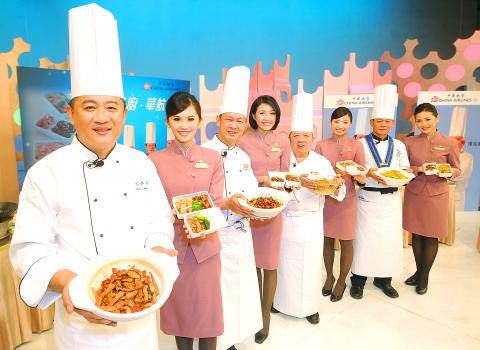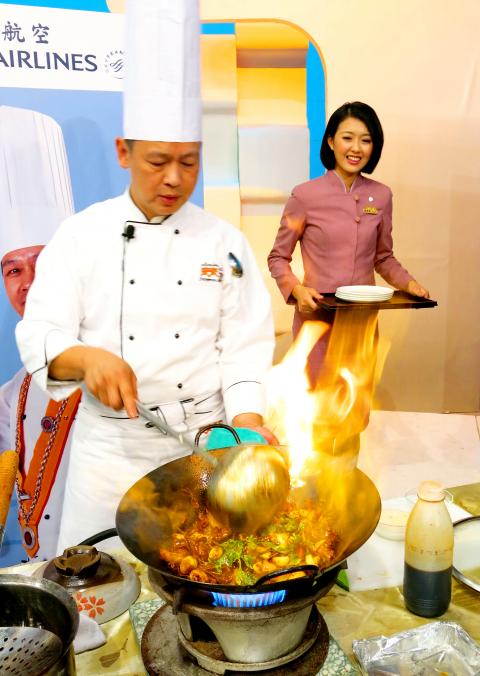EVA Airways Corp (EVA, 長榮航空), the nation’s second-largest airline, announced yesterday that its president, Chang Kuo-wei (張國煒), has been promoted to chairman of the company, taking effect on Tuesday next week.
Chang will replace James Jeng (鄭光遠), who will stay on as a member of the company’s board of directors, but will also take over as the chairman of the EVA’s subsidiary, Uni Airways Corp (立榮航空).
EVA’s board also appointed Austin Cheng (鄭傳義), executive vice president of the airline’s project division, to take over the position left vacant by Chang.

Photo: Fang Pin-chao, Taipei Times
“The airline industry has been highly competitive over the past few years, which put some pressure on him [Chang] to take the position of chairman,” EVA spokesperson Nieh Kuo-wei (聶國維) said by telephone yesterday.
However, Nieh was upbeat about the carrier’s potential sales performance and profitability under Chang’s leadership.
Nieh said the carrier’s priority is to officially join Star Alliance — the largest airline alliance in the world — by the first half of next year, and the company has been already begun the integration process with other members of the alliance.

Photo: CNA
Chang, 42, is the youngest son of Evergreen Group (長榮集團) founder Chang Yung-fa (張榮發). He has been the president of EVA since December 2010.
Last month, Chang said EVA would focus on short-haul and medium-haul regional lines next year, eyeing the greater potential in cross-strait routes amid a stronger economic sentiment in Asia’s emerging markets.
The carrier also announced plans to sell NT$6.5 billion (US$223.14 million) in bonds next year to repay loans.
The amount of debt issued next year is set to be the same as this year, with the company not opting out of announcing additional bond plans next year.
In other news, China Airlines Ltd (CAL, 中華航空), the nation’s largest carrier, yesterday introduced new in-flight food services for economy-class passengers in a bid to boost sales.
The new Chinese-styled meals, designed by four famous Taiwanese chefs, will be offered on long-haul routes and regional routes in Northeast Asia from February next year, CAL said in a statement.
CAL president Sun Hung-hsiang (孫洪祥) said in October that he maintained a cautiously optimistic view of the company’s profitability in the fourth quarter, with the movement of global oil prices and the performance of the cargo industry being the greatest areas of uncertainty in the sector.

SEEKING CLARITY: Washington should not adopt measures that create uncertainties for ‘existing semiconductor investments,’ TSMC said referring to its US$165 billion in the US Taiwan Semiconductor Manufacturing Co (TSMC, 台積電) told the US that any future tariffs on Taiwanese semiconductors could reduce demand for chips and derail its pledge to increase its investment in Arizona. “New import restrictions could jeopardize current US leadership in the competitive technology industry and create uncertainties for many committed semiconductor capital projects in the US, including TSMC Arizona’s significant investment plan in Phoenix,” the chipmaker wrote in a letter to the US Department of Commerce. TSMC issued the warning in response to a solicitation for comments by the department on a possible tariff on semiconductor imports by US President Donald Trump’s

The government has launched a three-pronged strategy to attract local and international talent, aiming to position Taiwan as a new global hub following Nvidia Corp’s announcement that it has chosen Taipei as the site of its Taiwan headquarters. Nvidia cofounder and CEO Jensen Huang (黃仁勳) on Monday last week announced during his keynote speech at the Computex trade show in Taipei that the Nvidia Constellation, the company’s planned Taiwan headquarters, would be located in the Beitou-Shilin Technology Park (北投士林科技園區) in Taipei. Huang’s decision to establish a base in Taiwan is “primarily due to Taiwan’s talent pool and its strength in the semiconductor

Industrial production expanded 22.31 percent annually last month to 107.51, as increases in demand for high-performance computing (HPC) and artificial intelligence (AI) applications drove demand for locally-made chips and components. The manufacturing production index climbed 23.68 percent year-on-year to 108.37, marking the 14th consecutive month of increase, the Ministry of Economic Affairs said. In the first four months of this year, industrial and manufacturing production indices expanded 14.31 percent and 15.22 percent year-on-year, ministry data showed. The growth momentum is to extend into this month, with the manufacturing production index expected to rise between 11 percent and 15.1 percent annually, Department of Statistics

An earnings report from semiconductor giant and artificial intelligence (AI) bellwether Nvidia Corp takes center stage for Wall Street this week, as stocks hit a speed bump of worries over US federal deficits driving up Treasury yields. US equities pulled back last week after a torrid rally, as investors turned their attention to tax and spending legislation poised to swell the US government’s US$36 trillion in debt. Long-dated US Treasury yields rose amid the fiscal worries, with the 30-year yield topping 5 percent and hitting its highest level since late 2023. Stocks were dealt another blow on Friday when US President Donald